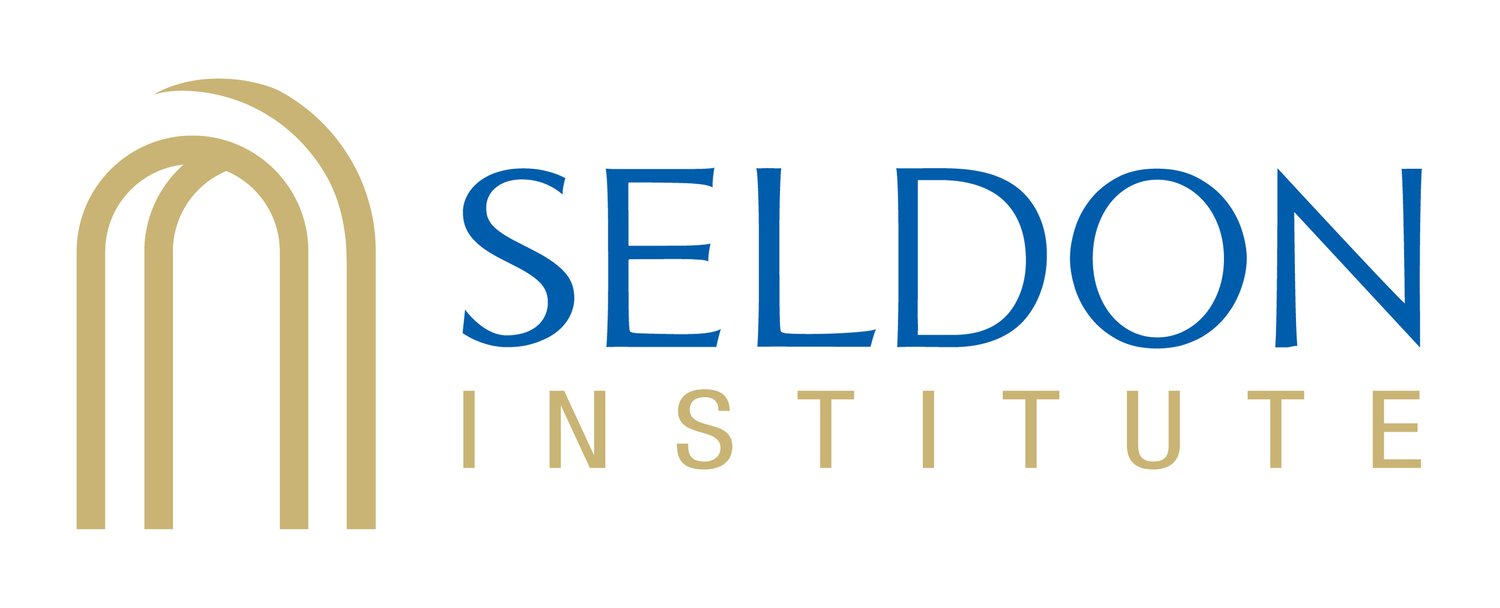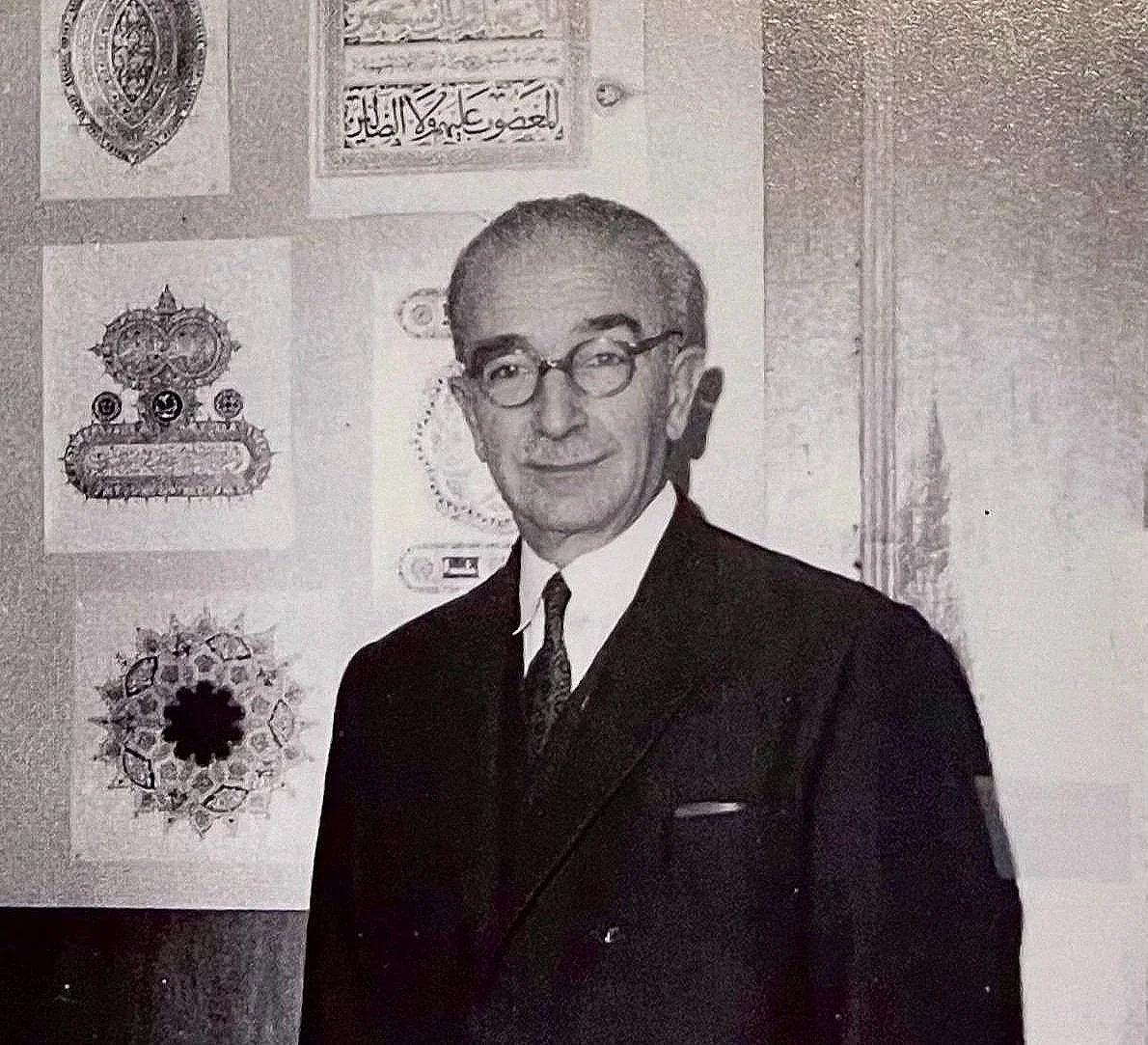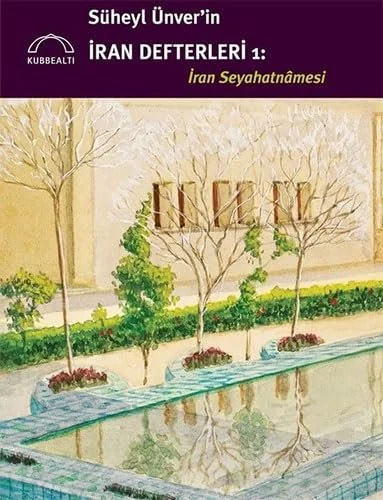Süheyl Ünver Atelier
The Atelier is named after Prof. Ord. Ahmed Süheyl Ünver (1898-1986), medical doctor, historian, writer and artist. Ünver was a prolific writer and teacher of miniature and illumination art. Through his research, lectures, and art workshops at Topkapı and Cerrahpaşa, he played a pivotal role in the preservation and revival of the traditional arts in the Turkish Republic, inspiring a national heritage in medicine and the arts. Gülbün Mesara, his daughter and student, would continue his work in the arts at Cerrahpaşa and the historical library of the Hekimoğlu Ali Pasha Mosque in Istanbul as Director of the prestigious Süheyl Ünver Atelier.
This image of Istanbul's most famous calligraphers and artists was taken in the Evkaf-ı İslamiye Müsezi on November 27th, 1923. Sühyel Ünver is top row, third from the left.
Sühyel Ünver taking a close look at the details on two different calligraphy styles of the bismillah.
This is a copy of Süheyl Ünver's work, gifted to Dina Rehab by Gülbün Mesara, Atelier Director and daughter of Süheyl Ünver, in 2024. This piece is of particular significance as it was partially painted by her mother. The original is in the Fatih Albums at Topkapı Palace Museum.
Süheyl Ünver surrounded by his students at Topkapı Sarayı Nakışhanesi (traditional arts studio), 1954.
Süheyl Ünver studying decorative motifs in a street of Istanbul.
A sketch of Mihrimah Sultan Mosque by Süheyl Ünver.
Süheyl Ünver Atelier at the historical library of the Hekimoğlu Ali Pasha Mosque in Istanbul, 2014. Left to Right: Dina Rehab (illumination), Gülbün Mesara (Atelier Director), Şermin Ciddi (miniature), and Nebahat Pektaş (illumination).
This photo was taken from the entry room at the historical library of the Hekimoğlu Ali Pasha Mosque in Istanbul.
The exterior of the historical library above the entry to the Hekimoğlu Ali Pasha Mosque in Istanbul.
“Ben 1500 yıllık İstanbulluyum. 1000 yıllık Hristiyan, 500 yıllıkda Müsülüman İstanbulluyum.”
“I am a 1500-year-old Istanbulite — a 1000 year-old Christian and 500 year-old Muslim Istanbulite.”
-Süheyl Ünver
Ahmed Süheyl Ünver
February 17, 1898 - February 14, 1986
Born in Istanbul, Ahmed Süheyl Ünver was a passionate Istanbulite. He often walked the streets of Istanbul, stopping for hours to sketch and document its architecture, scenery, and decorative motifs found on tombstones and historical buildings. His maternal grandfather was renowned Ottoman Calligrapher Mehmed Şevki Efendi (1829-1887). Despite never meeting his grandfather, Ünver’s identity was inextricably interwoven with the traditional arts.
He studied at the Darülfünun-ı Şahane (1915-1920), now Istanbul University, and with the famous illumination, marbling, and calligraphy masters of his time (1916-1923)— Yeniköylü Nuri Bey (illumination), Necmeddin Okyay (marbling), and his brother-in-law Hasan Rıza Efendi (calligraphy). He also studied sketching and painting with Hoca Ali Rıza Bey and frequently attended the conversation circles of Abdülaziz Mecdi Tolun Efendi — author, politician, poet and Sufi.
After he graduated from the Imperial School of Medicine (Mekteb-i Tıbbiye-i Şahane) and the Calligraphy School (Medresetül Hattatin), he left to continue his medical training in Paris (1927-1929). During this time, he frequently visited the Bibliothèque Nationale de France to examine manuscripts on Turkish-Islamic medicine in the Oriental Manuscripts section. He also researched and documented the history and techniques of miniature and the decorative arts in his notebooks and hand-copied their designs. He would continue this throughout his travels documenting the decorative motifs he saw in his notebooks, many which were published, including the Egypt, Iraq, and Iran notebooks—gifted by Gülbün Mesara to Dina Rehab and now accessible at the Seldon Institute in Chicago.
A historiographer and archivist, Ünver was preoccupied with the preservation of knowledge to inspire a national history through medicine, architecture, and the traditional arts. His scholarly pursuits led him to conduct extensive research on the history of medicine, focusing on Turkish medical traditions spanning from pre-Islamic Anatolian civilizations to Ottoman-Islamic practices. He would spend a significant time of his life researching the history of Turkish medicine, which he classified under Seljuk and Ottoman, particularly their treatment methods and the aesthetics in hospitals and schools during these periods.
In 1930, he was appointed as an assistant professor at Darülfünun Faculty of Medicine and remained in his position at Istanbul University Faculty of Medicine following the 1933 reforms, when he founded the Institute of Medical History (Tıp Tarihi Enstitüsü) and served as its Director. In 1936, he started his work at the 500-year-old art studio (nakışhane) in Topkapı Palace Museum, where he lectured and taught gilding and miniature painting for 19 years. His student and daughter Gülbün Mesara would later resume his work as the director of the Süheyl Ünver Atelier.
Süheyl Ünver became a Professor at Istanbul University in 1938 and a Distinguished Professor in 1954, retiring in 1973. In 1981, he received the Certificate for Eminent Services at the 1st International Congress of the History of Turkish and Islamic Science and Technology. He would also receive the Honorary Award for Eminent Services to Turkish National Culture from the Foundation for Turkish National Culture and the Grand Prize for Culture and Arts from the Ministry of Culture.
Ünver produced over 3000 notebooks, preserving the history of the traditional arts, and over 2000 publications on his medical research. After he retired, he donated some of his books as well as notebooks from his personal archive to the Süleymaniye Library, Turkish Historical Society and the Institute of Medical History at Cerrahpaşa Faculty of Medicine. He died at the age of 88 in his beloved Istanbul.
In recent years, Gülbün Mesara donated the remainder of his writings and some of his art work and tools to the Süleymaniye Library, where it is currently housed in a special collections room, the Süheyl Ünver Research Center.
Süleymaniye Library: Süheyl Ünver Research Center
Süleymaniye Kütüphanesi: Süheyl Ünver Araştırma Merkezi

















